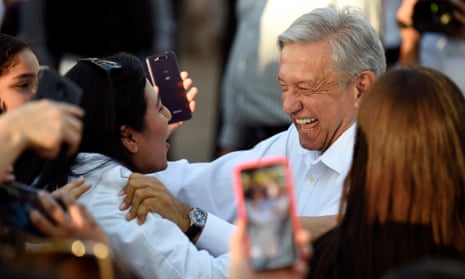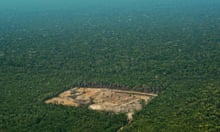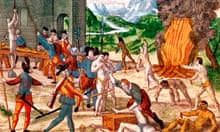A campesina calling herself Leocanda recently left her home in the pine-covered sierra of Mexico’s Sinaloa state in search of a favour.
Alongside her husband, a taciturn man in a cowboy hat, she travelled several hours down a perilous mountain road bearing a message for the powerful man she hoped could help her build a new house.
Here in the heartland of Mexico’s drug trade, peasant farmers have for generations scratched out a living from marijuana plantations and opium crops.
And in a region where the state has long been absent, they’ve also turned to local benefactors – such as recently convicted cartel kingpin Joaquín “El Chapo” Guzmán – to pay medical bills, pave roads and build schools and churches.
Recently, however, another figure has come to El Chapo’s homeland, promising to pave the winding sierra highway, open a university and employ 20,000 locals on reforestation projects: Andrés Manuel López Obrador, the president who is generally known as Amlo.
Waiting for the president on a recent afternoon, Leocanda asked a Guardian reporter to write down her message, admitting that she could not read or write.
But she was confident her request would be granted.
“This little old man,” she said of the president, “we think he’s fair and we’ll get ahead with him.”
Leocanda said she campaigned for López Obrador, who took office 1 December after a landslide election victory, because she was sick of the way local politicians get rich at voters’ expense.
“They end up with everything … It’s poor people who get the short end of the stick,” she said.
Then a look of concern flashed across her weathered face and she asked not to be quoted by name. “It would get me into all kinds of trouble,” she explained.
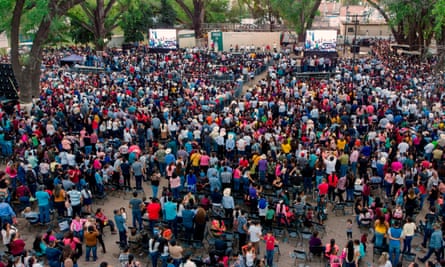
Amlo swept Sinaloa in last year’s election, and his Morena party won control of the state congress and several large cities – a reflection, say analysts, of widespread disgust with perceived corruption among mainstream politicians.
In many corners of Mexico, ordinary people often see crime bosses as less predatory than state governors and congressmen, said Víctor Gaixola, a Morena activist in Sinaloa.
“Organised crime doesn’t steal from them. They don’t steal tax money. They’re nothing more than drug dealers so, yes, people are upset,” he said. “People are offended by politicians because they think that they’re being robbed.”
El Chapo is still admired in the region – as much for his purported generosity as his prison escapes. But after the kingpin’s recent conviction in New York, analysts say some locals are seeking a way out of illegality as margins grow tighter and new generations of cartel bosses attempt to muscle in.
Amlo has promised to pull the marginalized sierra out of poverty, providing legal employment for its inhabitants and expanding services after centuries of neglect.
“Amlo knows drug cartels don’t do business or prosper without a social base and that base is bigger than we think, especially in the sierra,” said Adrían López, the editor of the Sinaloa newspaper Noroeste. “That he would go to Badiraguato is a way of recognising that social base and saying ‘I’m here for you.’”
Amlo travelled to Badiraguato on 15 February, just three days after El Chapo’s conviction in a US court. He arrived with only a small security detail and felt safe enough to dart out of his SUV to use the restroom at a toll booth.

He promised social spending, including $175 monthly stipends for young people not working or not studying “so (they) don’t see themselves forced to take the path of antisocial behaviour, so they have options”.
“Mexicans, human beings, are not bad by nature,” he added, “it’s circumstances that have brought many to take the wrong path.”
He didn’t mention the Sinaloa cartel boss by name, only referring to him as “a person being tried in the United States”.
Amlo has often appeared more willing to denounce corrupt politicians than cartel bosses. On a tour of Sinaloa shortly after El Chapo’s recapture in 2016 he declined to opine on Guzmán, instead telling reporters “the group that steals the most in Mexico is the cartel of [the former presidential palace] Los Pinos”.
But the day after El Chapo’s conviction, the president, who is famous for his personal austerity, added that he hoped El Chapo’s fate would serve as an example “that true happiness isn’t money, isn’t in material things, isn’t in cheap luxury, isn’t in fame”.
Guzmán’s arrest unleashed a bloody war of succession in Sinaloa, and now a new generation of capos have taken control of the region’s drug trade. But unlike their fathers, few of the new kingpins grew up in the impoverished hill-country – and observers say that relations have deteriorated between the cartels and the farmers who grow the raw materials.
On the campaign trail, Amlo promised a new approach to the militarized crackdown on drug cartels, and has pledged to abandon the practice of targeting cartel kingpins.
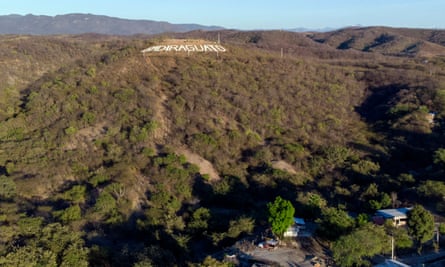
But critics see continuity. Amlo’s party is pushing on with plans to create a 60,000-member national guard, raising concerns that punitive tactics which have helped fuel Mexico’s violence will continue.
Meanwhile marijuana legalization in the US and the growing popularity of synthetic drugs such as fentanyl have caused the price of marijuana and opium poppies to collapse.
For farmers in the mountains of Sinaloa, Amlo’s offer of a way out of illegality couldn’t have come at a better time, said Rubén Rubio, who has worked on government programs in the region. “People in the sierra are tired of the narcos’ tactics and organised crime.”
